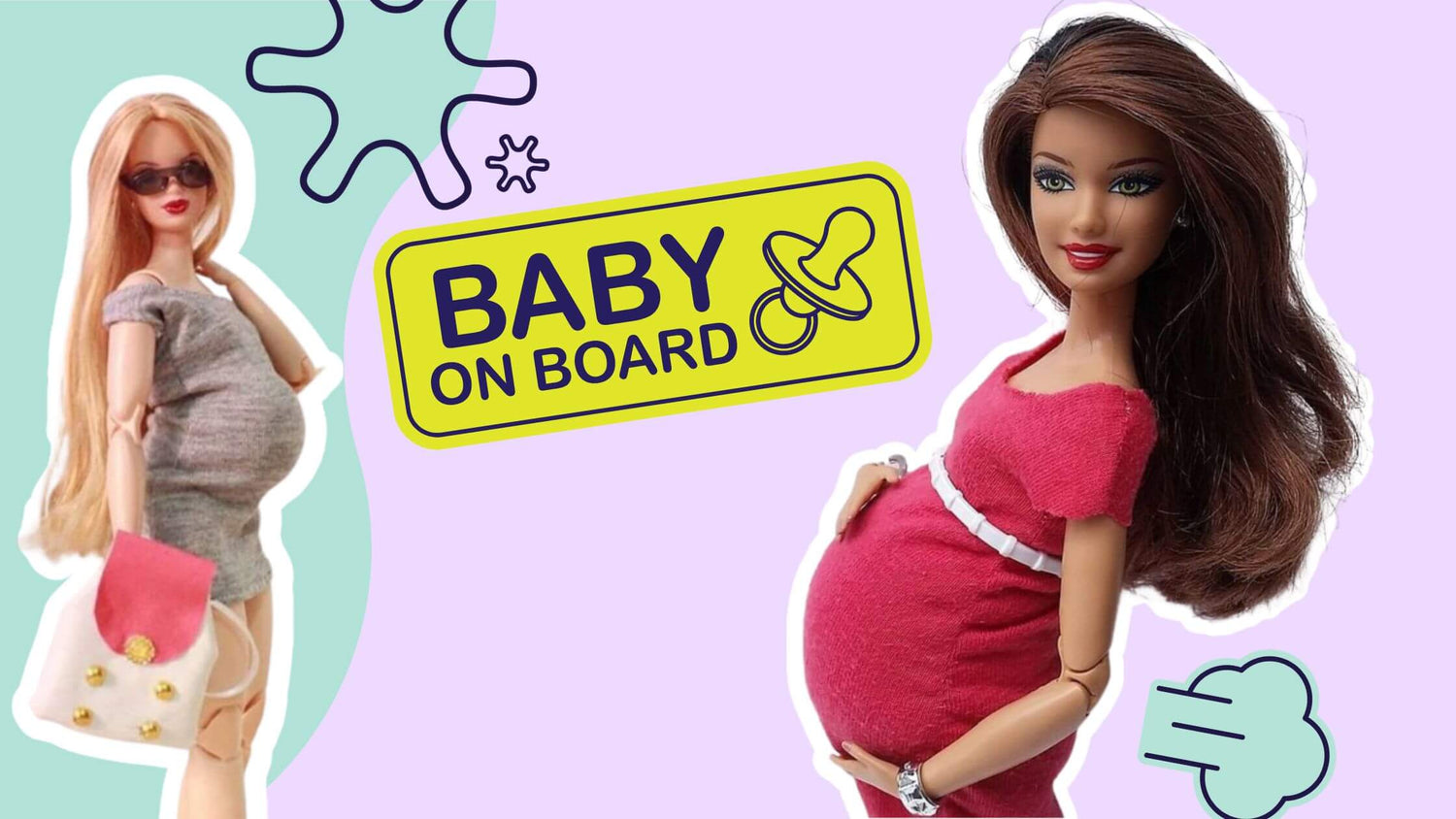How to Stop Pregnancy Bloating
Hormonal bloating is very common in women, with many women reporting that they feel especially bloated around the time of their monthly period. The changes in reproductive hormone levels lead to water retention, excess gas production, bloating, and constipation.
During pregnancy, a woman’s reproductive hormone production ramps up, and this can contribute to the worsening of hormonal symptoms. Pregnant women can experience a lot of bloating, which can be uncomfortable and even painful.
Luckily, there are lots of simple things that can be done to minimize pregnancy bloating. In this article, we will cover some of the best ways to get rid of pregnancy bloat. Even if you’re not currently pregnant, you can use some of our top tips to minimize hormonal bloating around your period.
Before we get into the top tips for reducing pregnancy bloating and water retention, let’s take a closer look at why pregnant women bloat, when bloating is most prevalent when you're pregnant, and how long bloating can last during pregnancy.
Why Do Pregnant Women Bloat?
As exciting as pregnancy is, it also comes along with a wide range of symptoms that can be tough to deal with. Pregnancy bloating is one of the most common symptoms that women experience, and it can appear as early as 1-2 weeks into pregnancy.
The question is, why is bloating such a common symptom in pregnancy?
During pregnancy, your body produces a hormone called progesterone, which is vital for foetal growth and development.
Progesterone can cause the muscles in your digestive tract to relax which slows down your digestion and causes food to sit in your intestines for longer than usual. When your digestion is slower, it leads to bloating, excess gas production, and discomfort in your abdomen.
Another hormone that is abundant during pregnancy is human chorionic gonadotropin (hCG), which is produced by the placenta (as is progesterone). Although essential for foetal growth, hCG can cause the stomach to empty more slowly, leading to bloating and indigestion.
As you continue further into pregnancy and your baby grows, it places pressure on the stomach and intestines, which can contribute to slower digestion and hormonal bloating.
When Does Bloating Happen During Pregnancy?
Bloating is one of the most common complaints among pregnant women, and it’s a symptom that can appear at any time during the nine-month pregnancy journey.
During the first trimester, bloating is often caused by the rapid hormonal changes that are occurring in your body. As progesterone levels increase, the muscles in your digestive tract begin to relax, which can lead to slower digestion and associated bloating. Plus, your body is producing more fluids to support your growing baby, which can also contribute to bloating.
In your second trimester of pregnancy, you might experience bloating due to the expansion of your uterus pushing against your digestive tract. When you intestines are compressed, it causes food to move more slowly through them, increasing the risk of pregnancy bloating and gas.
As you enter your third trimester, you might confuse abdominal bloating with your growing baby. You’ll feel heavier and bigger as your baby approaches full term. You might also experience bloating elsewhere in your body, such as in your face, hands, and feet, due to the increase in blood volume and water retention.
How Long Does Pregnancy Bloating Last?
Bloating can last throughout your whole pregnancy, or you might only experience it intermittently throughout your nine-month journey. Every woman's pregnancy is different (and you can have different experiences and symptoms in subsequent pregnancies).
Bloating can vary in duration and severity depending on a variety of factors, including your unique physiology, diet, physical activity, and underlying medical issues. Bloating can also be exacerbated by certain foods too.
It’s important to pay attention to how your body reacts to different stimuli, so you can work to avoid triggers and make yourself (and your growing baby) as comfortable as possible.
It’s important to note that although bloating is common and somewhat normal during pregnancy, it can be a sign of an underlying medical issue. Preeclampsia and gestational diabetes are associated with increased bloating during pregnancy, so you should always speak with your doctor or midwife if you’re concerned about your symptoms.
How to Stop Bloating During Pregnancy?
If you’re currently pregnant and feeling bloated, you might be searching for the best bloating remedies to tackle your symptoms. Luckily, there are plenty of dietary and lifestyle changes that you can make during your pregnancy to alleviate bloating, relieve constipation, and avoid other digestive issues.
1. Eat probiotic foods or take probiotic supplements
Digestive disturbances like bloating are often worsened by gut dysbiosis (which describes the imbalance in your gut bugs). Probiotics are live bacteria that are beneficial for your digestive health. They are found naturally in your gut, but you can consume probiotic foods or supplements to rebalance your gut microbiota if it's dysregulated.
Probiotic foods and drinks include:
- Yoghurt
- Sauerkraut
- Kefir
- Tempeh
- Tofu
- Kimchi
- Natto
- Miso
- Kombucha
You can also take probiotic supplements during your pregnancy to reduce bloating and keep your gut bacteria happy. There are hundreds of different probiotic supplements on the market, so it can be difficult to find the best one for you. You’ll want to get a high-quality probiotic supplement that contains high amounts of probiotic bacteria.
Our probiotic supplement, A Dose For Bloating, contains one billion live bacteria, including Lactobacillus and Bifidobacterium, as well as six different digestive enzymes, and seven plan extracts. You can rest assured knowing that A Dose For Bloating will alleviate your pregnancy bloating and minimise excessive gas. Note that you should always speak to your doctor or midwife before commencing a new supplement.
2. Eat smaller meals, more often
Eating large volumes of food at once can exacerbate bloating, especially during pregnancy. To keep bloating to a minimum, try and spread your meals throughout the day. Split your larger meals into several smaller meals that are easier for your digestive system to metabolise to reduce pregnancy bloating.
3. Exercise regularly
Physical activity is important for your overall health during pregnancy, and it’s also a great way to keep things moving along in your digestive tract. It enables you to stay strong and support your heart as it pumps a higher-than-normal volume of blood around your body.
Although exercise can get a little harder as your baby grows and you near your due date, you should still try and keep moving. Even light walking can be adequate to maintain your health and minimize pregnancy bloating. If you’re unsure what exercise you should be doing during each trimester of pregnancy, contact a qualified expert who can guide you through an appropriate exercise programme.
4. Stay hydrated
Water is a natural bloating remedy all on its own. Not only is it essential for all of your cells to function optimally, but it also aids your digestion. Staying hydrated ensures that food can move through your digestive tract easily, helping to avoid constipation, bloating, and cramping.
Drinking enough water also reduces the risk of dizziness and fatigue during pregnancy. Ideally, you should drink around eight glasses of water a day or more if the weather is particularly hot.
5. Massage your abdomen
Gently massaging your abdomen can stimulate contractions of the smooth muscles in your digestive tract, helping to push food along and reduce bloating quickly. Use circular motions and gentle pressure to massage the area after meals or snacks.
You could also hire a professional massage therapist who specialises in prenatal massage if you want expert help.
6. Wear loose, comfortable clothing
Tight clothing around your stomach can exacerbate bloating and digestive symptoms. Instead, go for loose, baggy clothing that isn't restricted and enables you to feel comfortable during your pregnancy.
You can purchase maternity dresses and T-shirts that are designed to stretch, and pregnancy trousers that have an elasticated waist band.
7. Reduce your psychological stress
Psychological stress increases the levels of cortisol (the 'stress' hormone) in your body. When cortisol is high, your body can go into 'fight or flight' mode and, as a result, it retains more fluid.
Water retention in your digestive tract causes bloating and can be very uncomfortable to deal with during pregnancy. By minimising your stress, you can lower your cortisol levels and keep digestive issues to a minimum.
8. Eat fibre-rich foods
Fibre-rich foods (prebiotics) feed the beneficial probiotic bacteria in your gut, supporting digestion and reducing the risk of bloating. Your gut bacteria can break down prebiotic fibres into short-chain fatty acids and other beneficial compounds that support your body’s daily processes.
Foods that are abundant in fibre include wholewheat pasta, lentils, black beans, chickpeas, oats, quinoa, chia seeds, raspberries, blueberries, pears, and almonds. Add a range of these foods into your diet throughout your pregnancy and you should notice improvements in your digestive health.








